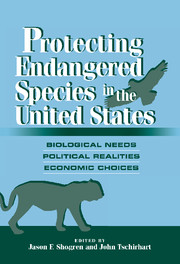 Protecting Endangered Species in the United States
Protecting Endangered Species in the United States Book contents
- Frontmatter
- Contents
- About the Authors
- Acknowledgments
- Foreword
- 1 The Nature of Endangered Species Protection
- PART 1 BIOLOGICAL NEEDS
- 2 Endangered Thought, Political Animals
- 3 A Market Solution for Preserving Biodiversity: The Black Rhino
- 4 Extinction, Recovery, and the Endangered Species Act
- 5 Some Economic Questions about the Biology of Biodiversity Protection: Comments on Gibbons, Brown and Layton, and Beissinger and Perrine
- PART 2 POLITICAL REALITIES
- PART 3 ECONOMIC CHOICES
- PART 4 SUMMARY AND DATABASE
- Index
2 - Endangered Thought, Political Animals
Published online by Cambridge University Press: 06 July 2010
- Frontmatter
- Contents
- About the Authors
- Acknowledgments
- Foreword
- 1 The Nature of Endangered Species Protection
- PART 1 BIOLOGICAL NEEDS
- 2 Endangered Thought, Political Animals
- 3 A Market Solution for Preserving Biodiversity: The Black Rhino
- 4 Extinction, Recovery, and the Endangered Species Act
- 5 Some Economic Questions about the Biology of Biodiversity Protection: Comments on Gibbons, Brown and Layton, and Beissinger and Perrine
- PART 2 POLITICAL REALITIES
- PART 3 ECONOMIC CHOICES
- PART 4 SUMMARY AND DATABASE
- Index
Summary
ALEXIS, WE HARDLY KNOW YE
In April 1997, the television network C-Span set out on a nine-month bus tour to retrace the travels and intellectual terrain of Alexis de Tocqueville. Television is seldom a medium for serious education, but here was an effort that has potential for opening our minds.
It was nearly 166 years ago that this twenty-five-year-old French aristocrat arrived in New York and set off by steamer, coach, horseback, and on foot to absorb and analyze the character of our nascent democratic society. Tocqueville did so with a clarity and eloquence unmatched by any other observer before or since. The painful irony is that his classic work is such a stranger to American education. We could make no greater progress against the momentum of specialization and fad in our institutions of higher learning than to require, as a condition of graduation, the study of Tocqueville's Democracy in America.
In this book on preserving endangered species, it is especially appropriate that we revisit Tocqueville, for we are engaged on yet another political issue of great weight that is being clouded by the struggle for public opinion, and it behooves us to understand why candor has such difficulty surfacing in American politics.
Tocqueville was a liberal in the true sense of the word, that is, a man passionate on the question of individual liberty, especially liberty of the mind. While there was much in American democracy that held his admiration, he was troubled by how majorities lead to a constriction on independent thinking.
- Type
- Chapter
- Information
- Protecting Endangered Species in the United StatesBiological Needs, Political Realities, Economic Choices, pp. 23 - 31Publisher: Cambridge University PressPrint publication year: 2001


